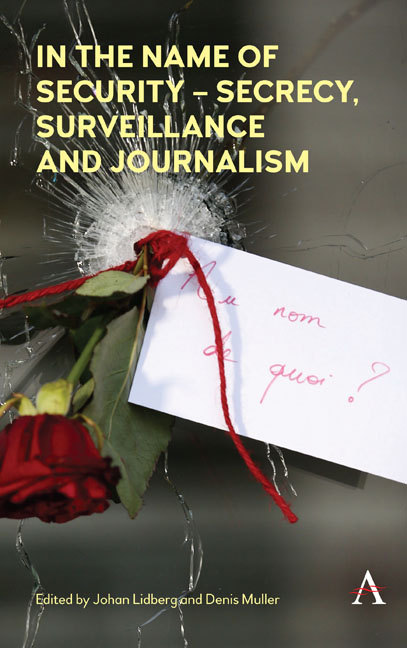Book contents
- Frontmatter
- Contents
- List of Tables
- Introduction
- Chapter 1 The Public Privacy Conundrum – Anonymity and the Law in an Era of Mass Surveillance
- Chapter 2 Undesirable Types – The Surveillance of Journalists
- Chapter 3 Surveillance and National Security ‘Hyper- Legislation’ – Calibrating Restraints on Rights with a Freedom of Expression Threshold
- Chapter 4 The Ethics of Reporting National Security Matters
- Chapter 5 When One Person's Noble Whistleblower Becomes Another's Poisonous Leaker
- Chapter 6 Who Watches the Watchmen? Access to Information, Accountability and Government Secrecy
- Chapter 7 Eyes and Ears in the Sky – Drones and Mass Surveillance
- Chapter 8 Looking over My Shoulder – Public Perceptions of Surveillance
- Chapter 9 Journalism and National Security in Three BISA Countries – Brazil, India and South Africa
- Chapter 10 Journalism and National Security in the European Union
- Chapter 11 The Security Reporter Today – Journalists and Journalism in an Age of Surveillance
- Conclusion: Journalism and the State of Exception
- Contributors
- Index
Chapter 5 - When One Person's Noble Whistleblower Becomes Another's Poisonous Leaker
Published online by Cambridge University Press: 21 June 2018
- Frontmatter
- Contents
- List of Tables
- Introduction
- Chapter 1 The Public Privacy Conundrum – Anonymity and the Law in an Era of Mass Surveillance
- Chapter 2 Undesirable Types – The Surveillance of Journalists
- Chapter 3 Surveillance and National Security ‘Hyper- Legislation’ – Calibrating Restraints on Rights with a Freedom of Expression Threshold
- Chapter 4 The Ethics of Reporting National Security Matters
- Chapter 5 When One Person's Noble Whistleblower Becomes Another's Poisonous Leaker
- Chapter 6 Who Watches the Watchmen? Access to Information, Accountability and Government Secrecy
- Chapter 7 Eyes and Ears in the Sky – Drones and Mass Surveillance
- Chapter 8 Looking over My Shoulder – Public Perceptions of Surveillance
- Chapter 9 Journalism and National Security in Three BISA Countries – Brazil, India and South Africa
- Chapter 10 Journalism and National Security in the European Union
- Chapter 11 The Security Reporter Today – Journalists and Journalism in an Age of Surveillance
- Conclusion: Journalism and the State of Exception
- Contributors
- Index
Summary
Introduction
The rise of the surveillance state simultaneously hinders and helps the practice of investigative journalism. It also hides from view a perennial and very human problem – the interaction between journalists and their sources. There is a good deal packed into those two sentences, so let me explain. The advent of web 2.0 this century has ushered in a range of new digital communication technologies that make it possible for a range of state actors, such as police and intelligence agencies, to monitor citizens, including journalists, through their online activity, whether on their computer or smartphone. The extent to which our lives can be tracked via our digital footprint raises questions in itself, but they are magnified for journalists who are duty- bound to scrutinise and even challenge those in charge of the surveillance. The perennial weighing of the needs of national security against civil liberties has tilted inexorably toward the former in recent years, following the 9/11 terrorist attacks and more recently the rise of Islamic State.
These and other developments that hinder the practice of investigative journalism are discussed elsewhere in this book and so will not be the focus of this chapter. The same digital communication technologies, though, have helped investigative journalism immeasurably as they have enabled the leaking of massive caches of documents that dwarf previous landmark leaks, such as the Pentagon Papers. This practice was pioneered by WikiLeaks, beginning in the mid- 2000s and achieving global impact in 2010, with the release of logs about the wars in Afghanistan and Iraq that followed the 9/11 attacks. Where the Pentagon Papers comprised about 2.5 million words, the Afghan and Iraq War Logs amounted to an estimated 300 million words (Harding 2011, 5). Only excerpts of the Pentagon Papers were published by the New York Times when they were leaked by Daniel Ellsberg to the newspaper in 1971 (US National Archives 2011). The practice was cemented in 2013 when Edward Snowden, a former contractor to the National Security Agency (NSA) in the United States, leaked thousands of pages of NSA documents to independent documentarian Laura Poitras and freelance journalist Glenn Greenwald that were published by the Guardian (Greenwald 2014).
- Type
- Chapter
- Information
- In the Name of Security - Secrecy, Surveillance and Journalism , pp. 101 - 120Publisher: Anthem PressPrint publication year: 2018



